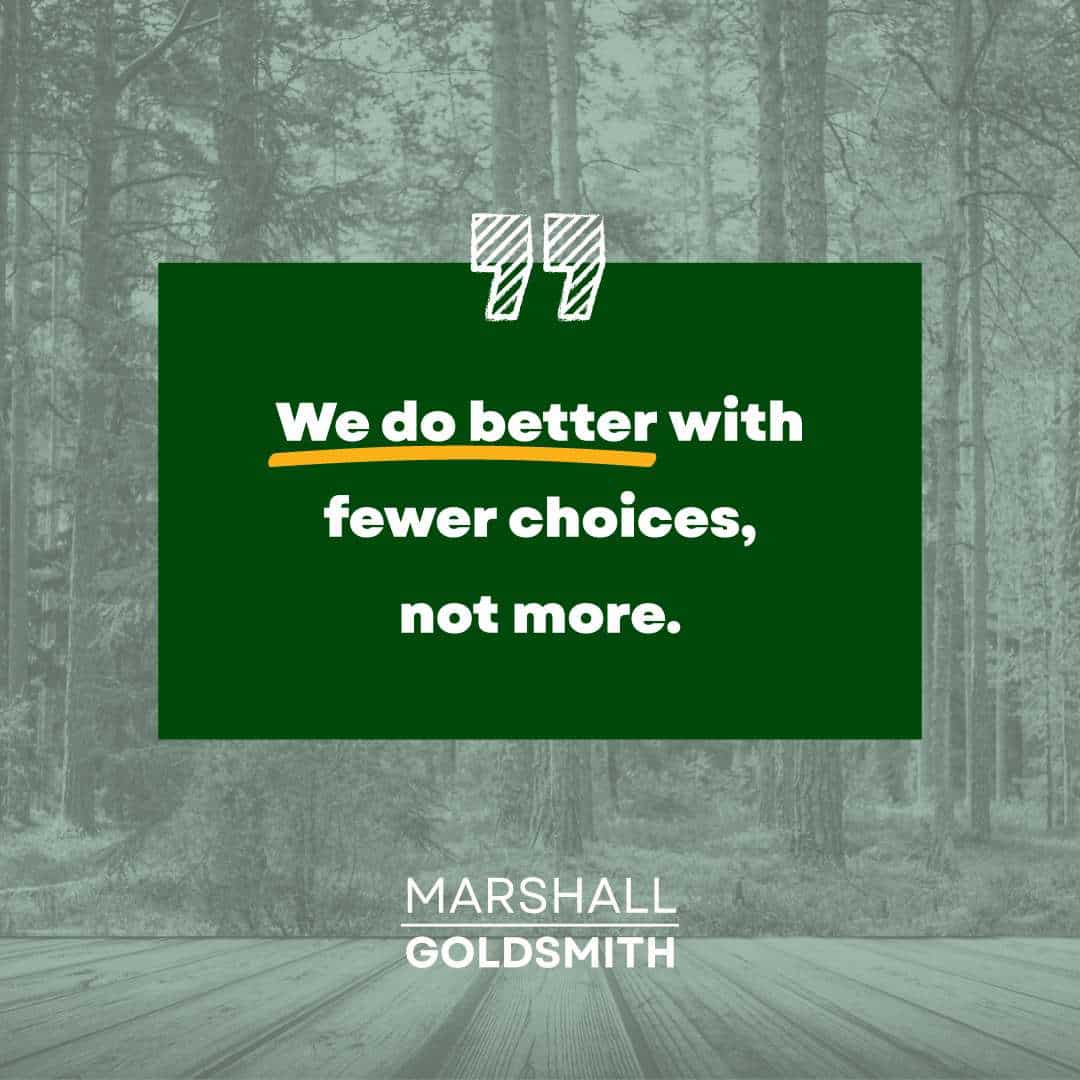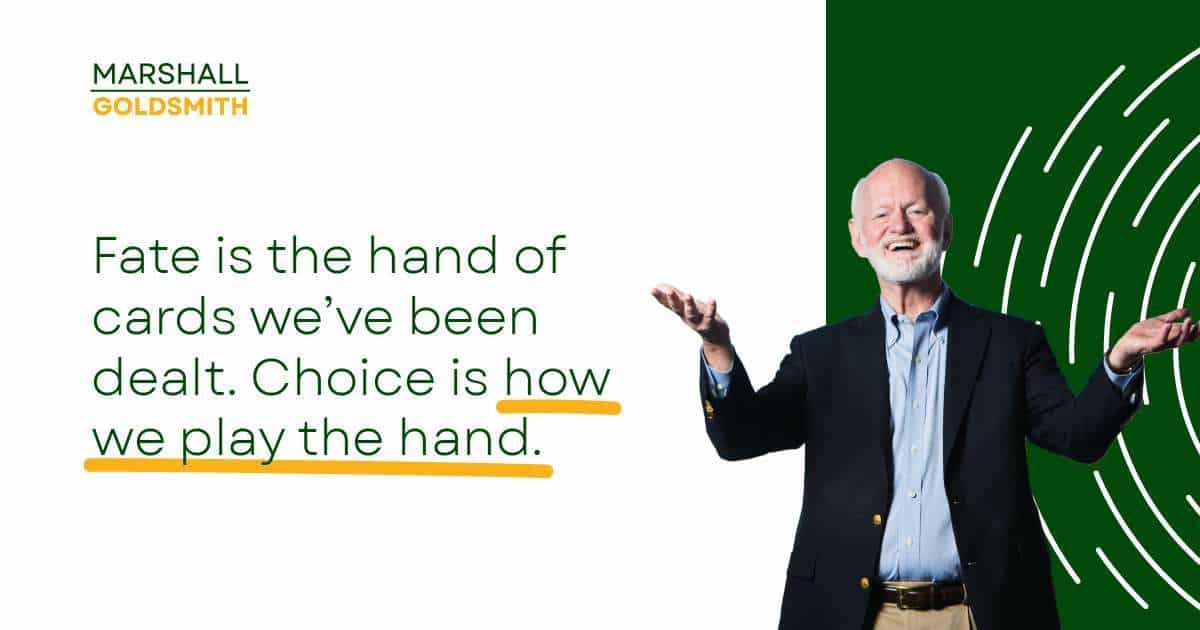Playing Favorites By Marshall Goldsmith There’s a reason I devote...
When do you know when it’s time to pivot, or that you’re at a point where you have achieved enough? When do you know deep down that your priorities have changed?
In novels, movies, and plays, there is usually a time when a character or characters have an epiphany, a moment of clarity about the situation they’re in, the future they face, or the choice they made — and what that all implies. In real life, most of us don’t look inward enough to realize when we should land the airplane we’re on.

If you’re not focusing on your priorities in life — putting a job ahead of what will fulfill you, for instance — you won’t be thinking about your runway. You are likely to be gliding along until you have to land. It’s often not your choice. You may not know what lights you up, or you haven’t given yourself the space in life to discover it — your runway is too short to figure out your strengths, what piques your interest, what fulfills you.
But many people don’t change their lives because they think they’ve run out of runway.
There’s a story of a man named Joe who wanted to be a playwright, but he discovered in his mid-twenties that his true passion was wine. So Joe switched gears and became a wine writer. He got paid to taste and learn about specific wines, and then to write about it. A portion of every writing fee went to buying wine for himself.
He started in the late 1970s, long before the world’s great wines were priced upward for billionaires. On his modest journalist’s salary, he amassed a fifteen-thousand-bottle collection that was the envy of the wine world. He was generous, not miserly, with his rare wines. If you invited Joe and his wife to your home for dinner, he’d offer to provide the wine—and you’d be a fool to say no. The great winemakers knew him and included him on the short list of connoisseurs who got first crack every year at their limited supply of new vintages.
In his mid-sixties, Joe received the annual prerelease offering from one of Italy’s superstars, Angelo Gaja. Joe did the calculation and realized that he would have to live well into his nineties before that year’s Gaja offering would be ready to drink. Thus, he made the poignant call to Signor Gaja, repeating the same call to other winemakers, asking to be removed from their lists. He had enough of their wines in his cellar to last a lifetime. As a wine collector, Joe didn’t have any more runway.
“Runway” is the time we’ve metered out to ourselves to achieve our destiny. Some of us—elite athletes, fashion models, ballet dancers, and any other “performer” relying on physical vigor or beauty, which fades with time—can calculate our runway as precisely as Joe. Many American politicians—such as presidents and thirty-six of fifty state governors—have term limits that detail to the day how much time they have to achieve their agenda. Most of us—artists, doctors, scientists, investors, teachers, writers, executives, and others who use our brains for a living—assume that our runway extends for as long as we retain our faculties and desires.
The rest of us don’t have enough information to calculate our runway or to appreciate when it has ended. There are two occasions when the runway becomes a major obstacle. When we’re young, we tend to overestimate our runway. Money may be scarce, but time seems infinite, dampening our sense of urgency. We put off the start of our “real life” to test more appealing or fanciful options. We’ve got time to take a so-called gap year. Nothing wrong with that — except when indecision or inertia extends our gap year into a “gap decade” or, worse, a “gap life.”

The other extreme—when we’re old—is more invidious: We foolishly believe there’s not enough time to achieve our next dream. We have “aged out.” I see this all the time when my CEO clients are approaching “retirement age.” Material success is not a concern. They are willingly moving on and passing the leadership torch to the next generation.
They still want meaning and purpose in their lives, but through a catastrophic misinterpretation of the significance of their past, present, and future, they let their age shut down the opportunity for a fresh start. They think no one will hire or invest in a sixty-five-year-old when so many younger candidates are available. (They’re not entirely wrong. People tend to prefer new over demonstrably good.) They’re staring at a broken clock, convinced that time has stopped for them.
Adults are capable of miscalculating their personal runway at any age, from twenty-five to seventy and beyond. I know thirty-year-olds who, after three years of law school and a half dozen years climbing the associate ladder at a firm, realize that practicing law is not for them. It’s a commonplace for young attorneys at corporate firms in the twenty-first century. Paralyzed by the prospect of restarting their career at ground zero, the young attorneys struggle in three ways: First, they treat their early disappointment as a catastrophe rather than the blessing it actually is (after all, they’re escaping a job that bores them); second, they cannot imagine a next step; and third, they don’t appreciate that they have two-thirds of their adult life ahead of them. That’s a lot of runway, which some people find daunting — but I suggest that it’s a lifeline.
Parental influence. Obligation. Mental block. Peer pressure. Not enough time. Inertial devotion to the status quo. These are the perennial barriers that freeze us in place and leave us yearning for a new path, yet unable to take the first step on that path. But these barriers are just temporary obstructions that can be pushed aside so we can move on. They are not permanently disqualifying conditions or articles of faith that we cannot rewrite or replace.
We possess offsetting attributes that enable us to find our way. They’re not a big mystery. They are latent powers such as motivation, ability, understanding, and confidence that reside within all of us, waiting to be stirred to life under the right conditions. They are the building blocks of our potential. And we need to be reminded on occasion how to deploy them for our own benefit.
Here’s an exercise that will help you understand your life and your future:
Imagine you are six. Your parents have invited their best friends for dinner. After dinner, with the adults believing that you are in bed asleep, one of the guests asks what you are really like.
Assuming your parents would give the unvarnished truth about you, make your best guess as to what your parents would say:
What did you learn from this exercise that will help you plan the rest of your life?

Adding Too Much Value Won’t Get You There By Marshall...
C-Suite Master Class: No, But, However By Marshall Goldsmith Continuing...
The Doerr Institute: Expanding the Market for Coaches By Marshall...
Making Leadership Development Part of the College Degree at Rice...
Sanyin Siang – Winner of the Thinkers50 Marshall Goldsmith Coaching...
Thinkers50 Marshall Goldsmith Distinguished Achievement Award in Coaching – Nominees...
Leading with Influence: What Is Influence360°? By Marshall Goldsmith Founder...
Are You a Dominator, Manipulator, Persuader or Influencer? By Marshall...
Leading with Influence: Redefining Modern Influence Part 2 By Marshall...
My mission is simple. I want to help successful people achieve positive, lasting change and behavior; for themselves, their people, and their teams. I want to help you make your life a little better. With four decades of experience helping top CEOs and executives overcome limiting beliefs and behaviors to achieve greater success, I don’t do this for fame and accolades. I do this because I love helping people!
As an executive educator and coach, I help people understand how our beliefs and the environments we operate in can trigger negative behaviors. Through simple and practical advice, I help people achieve and sustain positive behavioral change.